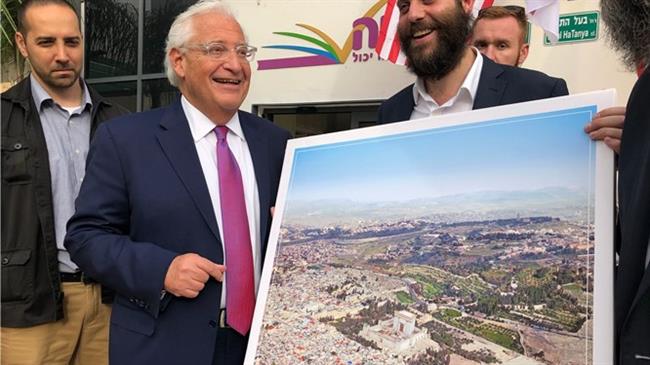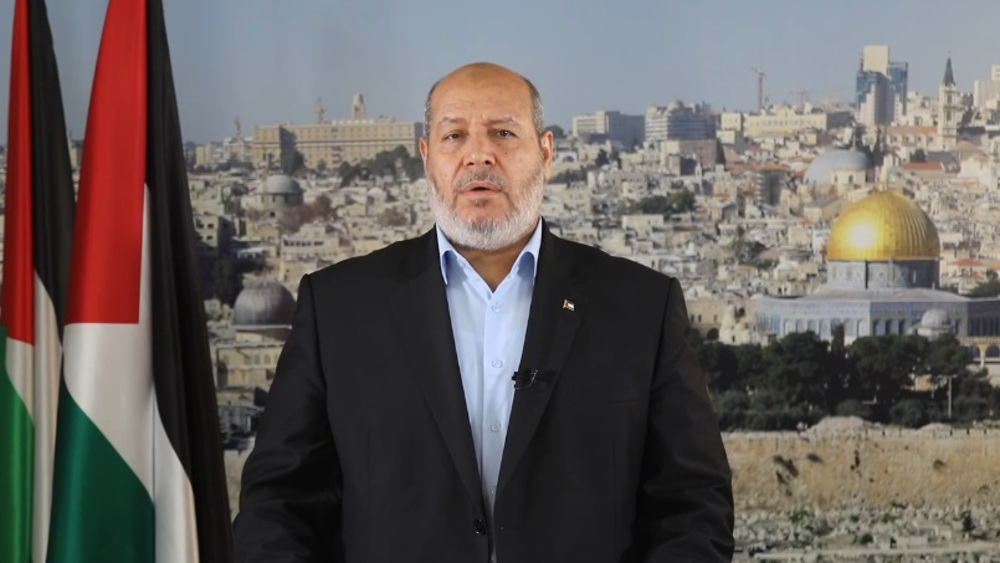US envoy labeled 'a terrorist' after posing with poster of obliterated al-Aqsa
US Ambassador to Israel David Friedman has come under fire for posing with a doctored aerial photo of Jerusalem al-Quds, which replaced the al-Aqsa Mosque — Islam’s third holiest site — and the Dome of the Rock, known as al-Haram al-Sharif, with an imaginary temple.
Friedman received the poster as he was visiting Bnei Brak, a city located just east of Tel Aviv, during a tour organized by a radical Jewish organization on Tuesday.
The controversial image soon made the rounds on the social media, prompting widespread fury.
Egypt's Al Azhar, the Sunni Muslim world's foremost religious institution, condemned the move on Thursday, calling it " inappropriate and irresponsible."
In a statement, the organization blasted Friedman and the Israeli organization, Achiya, for continuing "the policy of the Zio-American provocation and damaging the feelings of a billion and a half Muslims around the world."
Referring to the city's status as the capital of a future Palestinian state, the statement stressed that the move "will not change history and al-Quds will remain the capital of the Palestinian people."
Al Azhar made it clear that the al-Aqsa Mosque "will remain in the hearts of Muslims.”
An aide to Palestinian President Mahmoud Abbas also censured the move, calling Friedman a "settler, terrorist."
US apology?
Wary that the backlash was going to further fuel Palestinian anger over the relocation of the US embassy from Tel Aviv to Jerusalem al-Quds, the US diplomatic mission rushed to criticize the move in a statement.
Claiming that Friedman was not aware of the alteration at the time, the US embassy demanded an apology later in the day and said the US supported the status quo at the holy site.
“Ambassador Friedman was not aware of the image thrust in front of him when the photo was taken,” the embassy said in a statement. “He was deeply disappointed that anyone would take advantage of his visit to Bnei Brak to create controversy."
Friedman, who oversaw the much-criticized embassy move last week, tried to contain the damage in a separate statement, saying he was "mortified more than any Palestinian" over the issue.
The Jewish organizers at Achiya also attempted to distance themselves from the matter by issuing an apology to Friedman and downplaying the incident as a “cheap political act” by an employee.
"The employee responsible for that has been identified and [he] has apologized, and we will deal with the issue internally in the organization,” noted the ultra-orthodox NGO.
This is while, Kikar Hashabbat, the Jewish website that first broke the news, identified the presenters of the poster as managers of Achiya, suggesting that the organization was fully aware of what it displayed.
Not the first time
The apologies from the US embassy and Achiya lose more weight when previous attempts by Israeli organizations to gloss over the Muslim holy sites are taken into account.
In June 2016, the Israeli tourism ministry stirred controversy by publishing a Jerusalem al-Quds map that omitted the key Muslim sites and simply referred to the holy sites by their Jewish name, the Temple Mount.
The map also angered Christian communities for failing to mention a number of historic churches in the area.
The Israeli ministry had a similar move in its 2010 version of the map, which blatantly annexed Palestine to Israel and omitted the existence of any Palestinian city.
Jan. 15: ‘Axis of Resistance’ operations against Israeli occupation
VIDEO | US fires: Criticism mounts over govt. failure to respond
VIDEO | Fears, hope in Gaza amid intensified ceasefire efforts
VIDEO | Press TV's news headlines
Hamas: Ceasefire agreement result of steadfastness, resistance in Gaza over 15 months
Hamas thanks Iran, Resistance Front following achievement of ceasefire in Gaza
'Capitulation': Israeli officials and media concede Gaza defeat as truce unfolds
'Gaza has won': Social media users react to ceasefire with mix of relief, joy












 This makes it easy to access the Press TV website
This makes it easy to access the Press TV website